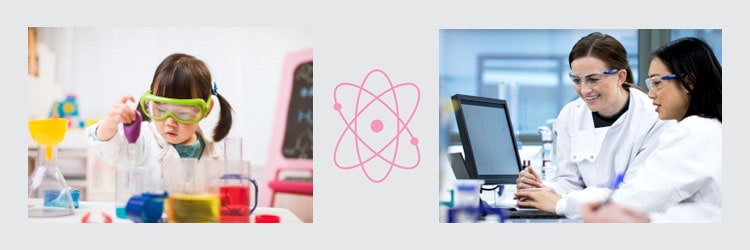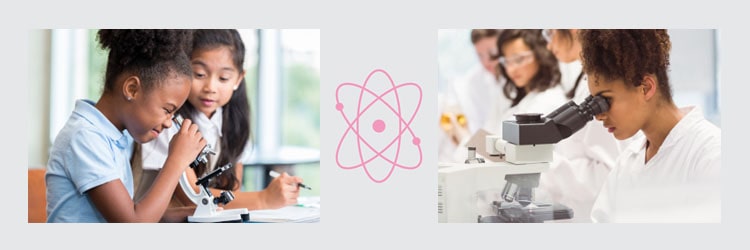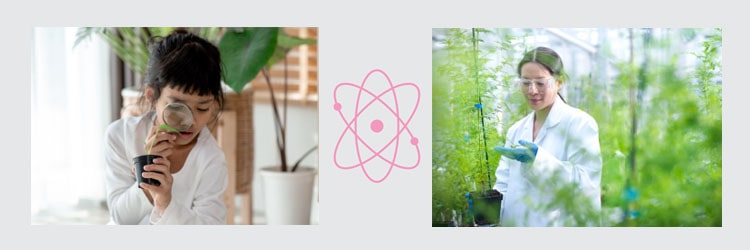
The 7th International Day of Women and Girls in Science is dedicated to achieving full and equal access to – and participation in – science for women and girls. The annual event, established by the United Nations General Assembly in 2015, also supports the UN global goal of gender equality and recognises that women and girls in science are agents of change.
To celebrate the role that women working at LGC play in bringing about equity, diversity and inclusion, we asked them about their personal journeys into science, how they feel as women working in the field, and the advice they’d give to girls considering a scientific career.
Selvarani Elahi, MBE
I was drawn to science from an early age because of a fascination that it can be used to both make and break things. I’ll leave the rest to your imagination!
I took the three sciences at ‘A’ level and then studied Chemistry with Biology at Kings College, London. Although I had a place to do a PhD, I decided to work for a year and then go back – 30 years later, I am still here! I joined LGC as a Scientific Officer in the Food and Nutrition Group. My first task was to set up methods for the determination of metals in foods using a new atomic absorption spectrometer. Unfortunately, the person due to train me was mugged just before I started, so I spent my first two weeks at LGC reading the instruction manual inside out, and doing lots of tidying up! In the last 15 years, my work has focused on managing complex food projects and working with the UK government to input into standards, regulation and policy, to ensure they are based on sound measurement science.
I believe that everyone should be able to pursue their chosen career, so it’s encouraging to see the progress made in trying to make sure that people have equal opportunities. I am proud to be a woman working in science today; whilst women are told ‘It is the 21st century and women can have it all’, this can quite literally mean having multiple jobs to juggle (professional, mother, and household organiser in my case!). However, organisations have become more aware of this, and people can work very flexibly now. I was especially pleased to see on social media that the LGC Berlin site has been ranked top out of 15,000 companies in a local competition as the 'Most family-friendly workplace' for a second year in a row. ????
I’d advise women wanting to go into science to choose a career that involves work you enjoy doing - as chances are, you will be working for a long time! Work hard, always put your ideas forward, and you will be heard.
Martina Kotthaus
At school, I enjoyed science and mathematics much more than languages. I found chemistry particularly stimulating, as our teacher showed us lots of exciting experiments. In the last two years at school, we were allowed to experiment ourselves, and made soap and guncotton. We were a very small class, with only nine students, and our teacher was very enthusiastic. Studying chemistry was the logical next step, and my father was also very supportive of my decision.
I studied in Stuttgart and Münster and followed that with a Postdoc in Lausanne before starting work in Vienna, in veterinary drug discovery. Afterwards, my work moved on to a bigger scale - to the development of active pharmaceutical ingredients in a Contract Manufacturing Organisation (CMO). Ultimately, I became responsible for development, including the transfer to the pilot plant, and I joined LGC in 2019.
Generally speaking, I have experienced only acceptance in the many years that I’ve worked in the chemical/pharmaceutical industry. I never had the impression that I was treated differently because of my gender. I believe that everyone should do what she or he enjoys, and not let themselves be held back by external or perceived conventions. Doing work you love is energising and creates a positive feedback loop.

Jane Firth
At school I realized I just ‘got’ science and others didn’t, so it seemed the right thing to pursue. I had an interest in all aspects of science, and a strong belief in the contribution it could make towards a better world. My friends were all going down creative or business routes, so I enjoyed the diversity. Some of my direction was definitely by inspiration, but some of it was just ‘luck’.
To me, ‘Science for a safer world’ is the ‘why’ we do what we do every day. It’s great that AXIO supplies 13,000 laboratories in more than 160 countries. But that is just ‘what’ we do. What we are passionate about is the fact that our work contributes in so many ways to ensuring a safer world through our science, and that of our customers. I love hearing about the work going on all across LGC: with the breadth of our technologies and services, and our global reach, we really can claim to deliver our vision.
To young women thinking about a career in science, I’d say: ‘Be curious, don’t be intimidated. Stay authentic and take - or ask nicely about - opportunities to do interesting things, even if they aren’t directly related to your current role.’
Huichen S.
I was interested in science because of my teachers in biology and chemistry. They opened my eyes to this fascinating field, and so I began my journey to where I am now, as a research scientist in the company.
Going into science was a rollercoaster ride for me. I was pursuing my dream with a higher science degree, halfway around the world from my home country. I encountered many challenges and difficulties along the way - like different cultures and different languages. It hasn’t been an easy journey but has been very rewarding for me, especially when I can solve problems.
For a woman, it is definitely a better environment now, compared to 20 or 30 years ago. There are more support systems and female mentors in science now that can guide you along the way. The most important lesson from my personal experience is: don’t let people tell you that you can’t do it. Continue to learn every single day. Don’t ever give up your dream, and have fun with the science.
Katrina E.
I am a questioner at heart. Early on, I found science to be the most effective way to pursue answers. I enjoy its balance of analytical thinking and creativity.
My parents were very active in social issues and showed me the value of asking questions and looking for new answers to ongoing problems. I grew up writing letters for Amnesty International and mostly reading fiction - allowing my mind to see all kinds of possible worlds. In middle school, I found a friend who shared my love of animals, maths, and nature. She and I had dreams of being medical doctors or veterinarians, so we volunteered for biology labs and joined the maths team together. We prided ourselves in being top of our classes and took as many science classes as we could during high school. Later, we both ended up at college together majoring in Biology. Our high school required a summer research programme, which was where I got my first taste of research. I worked for a professor who was studying toxicology and the effects of neurotoxins on birds, and I saw firsthand how scientific research could impact our community. I also had my first experience of working in a lab alongside graduate students, technicians, and professors. We trekked through the mud for field studies, spent hours homogenising tissue, running samples, and creating tables and graphs of our data. At the end of the summer, I was able to write and present my work - equipped with slides and my first suit – and the feeling of accomplishment has stayed with me. I’ve spent over 20 years working on molecular biology, neuroscience, forestry and now chemistry, but always remember how natural I felt in that first lab. My friend followed her own path by working at a raptor centre and is now a science teacher and mother. Having her to share both the joy and uncertainty at the start of this journey gave me the encouragement to continue and end up where I am now.
I have had mentors of both genders who have encouraged me along the way, so I feel optimistic about the future of women in science. I think women have a strength in their camaraderie that can be used to our advantage as a group, and to help each other shine. Emotional intelligence and a willingness to support your colleagues has a real value, especially when your success is linked to a team and not just personal achievement. I’d advise young women in science to find different ways to communicate and connect with your peers. Remember that practice makes everything easier. And always be willing to learn, but don’t doubt that you have something to contribute.

Kelly C.
Arthur C. Clarke said: “Magic is just science we don’t understand yet”, which is probably one of my favourite quotes, and what I love about science. I’ve been drawn to it for as long as I can remember – it’s the combination of wonder and logic that I find enthralling. I was particularly drawn to forensic science early on - perhaps in part due to a morbid sense of curiosity - but also because of the diversity of the topics it encompasses, which means it never ceases to amaze. Participating in such a science provides an enormous sense of fulfilment by being able to address real world problems. It’s the living embodiment of ‘Science for a safer world’.
I started off studying Chemistry at university before moving into Forensic Science – and I think it was here I really found my calling. I then pursued as many opportunities as possible in this space: from work placements to postgraduate degrees and presenting at conferences. My time at LGC has enabled me to nurture these passions further - as well as delve into adjacent areas in food, environment and cannabis testing, which I find equally captivating.
I’m proud to be a woman in science today. My advice for young women scientists would be: ‘Take advantage of as many opportunities as you can get your hands on. Never stop pursuing your dream and never be afraid to question what’s in front of you – it’s the best way to learn.’
Kathrin S.
During my school years, I found all the natural science subjects interesting. I started an apprenticeship as a chemical technical assistant, but it didn’t quench my thirst for knowledge, so I studied chemistry. Along the way, analytical chemistry captivated me the most. Finding out what, and how much, is contained in unknown samples was the biggest pleasure.
Throughout my education and my current employment at LGC, the proportion of women has always been very high, so it has never felt strange working in a scientific field. Regardless of gender, humans try to find solutions, and this is the goal of science in my eyes.
Nadine M.
I was always enthusiastic about subjects like chemistry and physics, and I really enjoyed learning more about them at school. As a young child I often read books about nature and science, because I was keen to find out what the environment had to offer.
After school, I decided to train as a chemical laboratory technician and applied to Dr Ehrenstorfer in 2009. I’m proud to be a part of science as a woman, and to make my contribution to LGC and the environment.
Heather Jordan
There are many non-scientist roles in the science business. While I’m not a scientist myself, I find great reward in supporting science, and do feel like my job has an extra purpose because the work we do makes our everyday lives that much safer. That said, I’m especially inspired by the female scientists with whom I collaborate, because women still aren’t equally represented in the field – though we are making tremendous progress! To any young woman, I would advise: ‘Find what stokes your fire and pursue that. Don’t worry about the career arc or the money, because those things work out if you’re passionate about what you do.’
Jessie Presswood
I adore working for an organisation that is focused on bettering the world through science, and I feel very lucky to be even a small part of this incredible company! I’d say to any young woman wanting to join a science organisation like LGC: ‘Find your why.’ Once you have that sorted out, it will translate into everything you do, making your experiences more fulfilling and meaningful.

Mackenzie Huneycutt
My mom was a nurse, and my dad a mechanical engineer, so maths and science were my best topics. When I was in a science class, it always fascinated me how unique every little thing in the world was, and that everything had a purpose and reason for how it acted. Plus, science experiments are always fun.
My high school teacher was the person who really piqued my interest in chemistry. He was the stereotypical ‘mad scientist’, and I loved his class because there was such a passion behind his lessons. My first chemistry-related job was in a pharmaceutical lab, and my favorite part was preparing samples, running the instruments, and problem solving if the data was not what you expected. That’s the great thing about science: chemical compounds and structures usually behave in certain ways, so if you can think through the challenge, then you can fix the problem! Now I get to help support multiple companies across North America with their new topics, research, and projects by providing the standards needed.
I love being a woman in science, and when I tell people what I do, they are always so interested in how I got there. Prior to working for LGC, I worked in a laboratory, and I was shocked by how many chemists were women. It was the first thing I noticed, because I didn’t think many women were in this type of industry. It made me feel great to be a part of the science community with other like-minded females.
If you are a woman and wanting to go into the science field, I would say: ‘Go for it! If it truly interests you, and you get those Ah-ha! moments when a scientific principle or law is explained and it just clicks for you, then follow that. If the passion is there for you and it makes you happy, then don’t let others persuade you out of it.’
Meenakshi Sharma
My family, and especially my father, was the reason behind my inclination towards science. I was born and brought up in India, and a TV show called ‘Turning Point’ also had a major influence in my life. In that show, wonders of science were presented in the simplest language to engage young minds. Gradually, my interest grew and that finally led me towards a career in science.
Rita Sharma
I've always been fascinated with science, and especially chemistry. If you like maths, you’ll like chemistry, is what I think – and I particularly liked the way the chemical reactions worked.
Science is very multi-task and, for women, multi-tasking is something that they can adapt to really easily. There are so many aspects to the job that I'm doing currently as a technical manager: you've got stats, you've got the chemistry and the production side of it. My day is different every single day and I can't plan it.
Shreya M
Science is about uncovering mysteries, coming up with a hypothesis and performing experiments to discover facts. The more the facts are discovered, the more complete understanding we have of how the universe works. Another major benefit of science is that, when we apply scientific discoveries, it can lead to us having more comfortable lifestyles.

Goonay Yousefalizadeh
My parents were the first to push me towards science: they always kept telling me: ‘Your knowledge is your greatest treasure, and no-one can take it away.’ In high school, I became interested in physics, chemistry and biology - and in my PhD, I had the chance to work on a multidisciplinary topic that brought physics, chemistry and biology together to develop a new cancer therapy agent. I realised that seeing what I’m capable of - and making my own contribution to science and technology as an individual - is the best feeling ever. One that fulfils my passion.
I am a simply a scientist who happens to be female. And just being a woman, doing what I love to do, shows other girls that it is possible. I have the privilege of living in a time and place where women are free to pursue their dreams. There are still many obstacles to overcome for women in science, but we should never give up on something we believe in, and that something is us women!
I’m genuinely looking forward to the day that scientists, like anyone making a valuable contribution to society, can be celebrated as such. As people who go out of their way to make an impact, and without any gender labels.
Pritika Gupta
Science begins with curiosity and never ends. As a child, I was always taught to think or ask ‘Why?’ This three-letter word has great significance in the development of personal behaviour, mental growth and analytical thinking. I believe women bring unique perspectives to research and scientific conversation. I still set off on the same path of ‘Why?’ with each new thing I see around me. Finding answers to that question is, and will always be, a marvellous journey.
